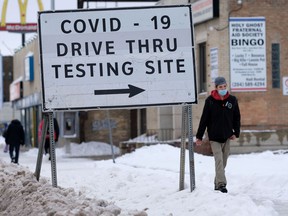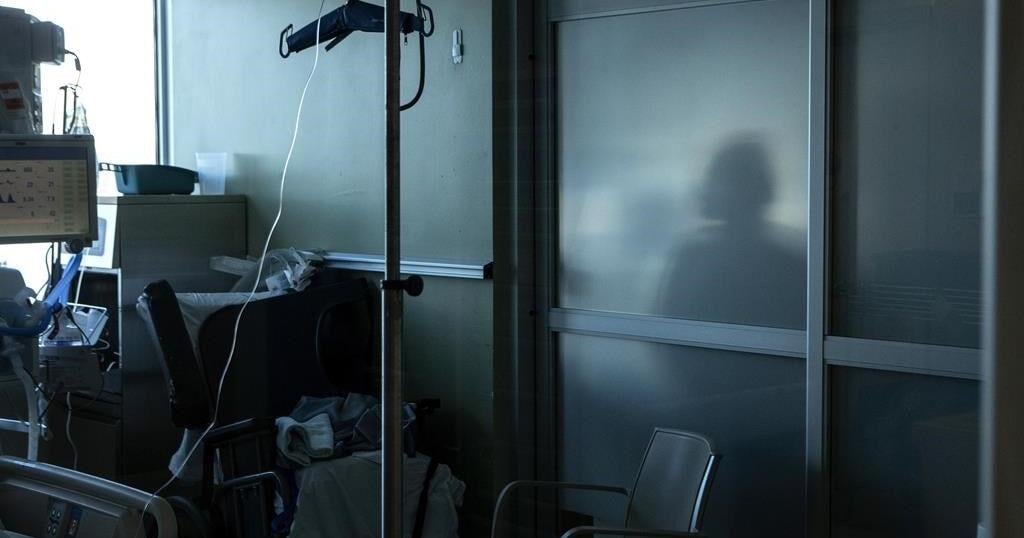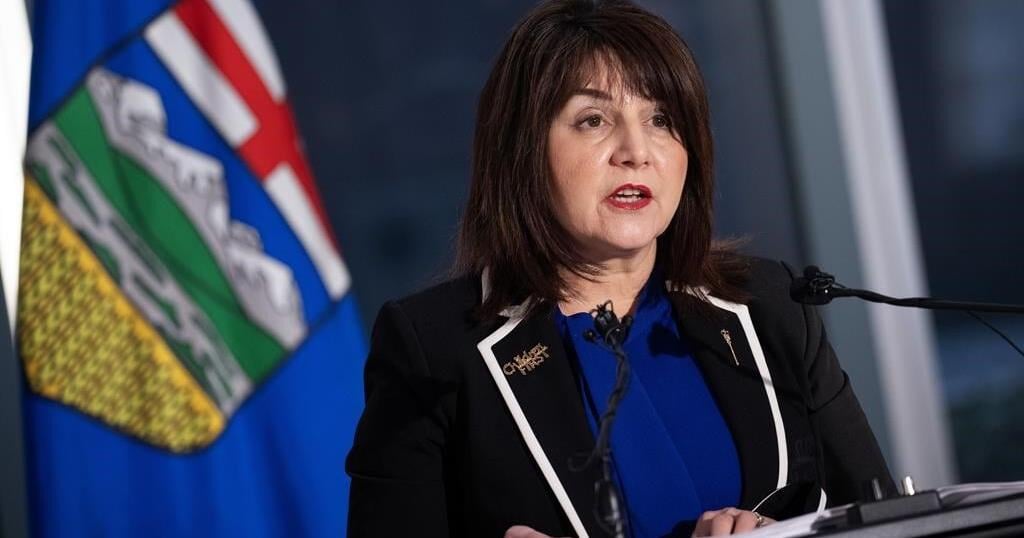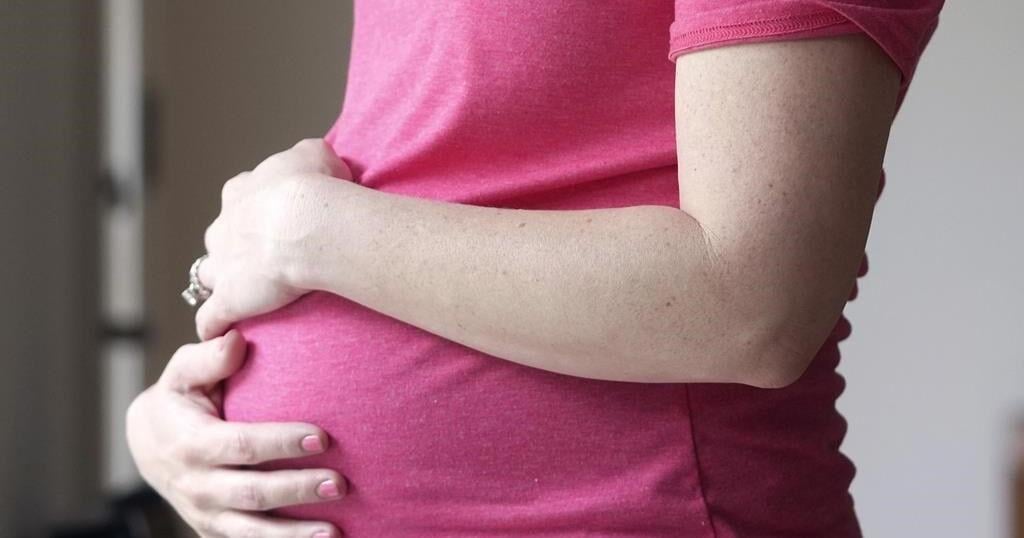Article content
If our COVID-19 caseload doesn’t improve, it’s possible the holiday season in Manitoba could bring the added gift of expanded health orders.

If our COVID-19 caseload doesn’t improve, it’s possible the holiday season in Manitoba could bring the added gift of expanded health orders.
As new COVID case counts continue to slowly climb in Manitoba, Dr. Brent Roussin, chief provincial public health officer, was non-committal about the ability to gather or move about the province over the next six weeks, during his weekly update on Wednesday.
“What we know is our trajectory is not in the right direction right now,” he said. “We know that our health-care system is continually at risk of being overwhelmed, so we need to bring down this transmission.”
He introduced new health orders last week that restricted the size of religous gatherings in the South, which continues to have the highest rates of new cases in the province mixed with the lowest rates of vaccine uptake, while also now requiring proof of vaccinations or negative COVID tests for youths 12-17 to participate in indoor sports.
The province’s top doc did not rule out more restrictions, but they are already pretty tight, especially for the unvaccinated.
“We’re certainly approaching a level of restrictions that limits the interaction between the unvaccinated,” said Roussin. “If we see numbers climbing and we see that strain on the health-care system, then we always have to consider doing more. What that ends up looking like depends on the specifics.”
He did say that if the province does get buy-in for vaccinations and current health orders and recommendations it can break up the transmission chains which would negate the need for further restrictions.
He was unable to provide any guidelines or parameters that would lead to the potential lifting of health orders or phasing out of the vaccination passports, as has been done in Ontario. Roussin said it would require a combination of vaccination levels mixed with the risk to vulnerable populations and the health-care system across Manitoba.
The province has announced two more deaths and 162 new COVID-19 cases in Manitoba on Wednesday.
The COVID-19 death toll now stands at 1,276. No information regarding the deaths was provided.
Of the new cases, 99 were not fully vaccinated as were 55% of the 111 active hospitalizations. There are now 24 active ICU cases, 19 of which are not vaccinated at all.
The South had the highest new case count with 57, while Winnipeg had 46, Prairie Mountain Health had 27, while both the Northern and Interlake-Eastern health regions had 16.
The five-day provincial test positivity rating has dropped from 5.9% to 5.7%.
The jump in cases follows a drop to 99 on Tuesday, which Roussin said was likely aided by inclement weather keeping people from going to get tested.
There are currently seven outbreaks in Manitoba schools, with 68 cases related to those outbreaks.
Roussin said while they do see transmission in schools, most of the transmission is happening in the community or at home and then the cases show up in school.
Southern Health continues to lag behind the rest of the province in vaccination rates. As of Wednesday, 84.4% of eligible Manitobans were fully vaccinated and 87.2% had at least one dose. There were 784 doses scheduled for Wednesday.
Just 68.8% of eligible people in the South have been vaccinated while 89.4% in Winnipeg, 85% in Northern Health, 83.2 in Interlake-Eastern and 82.1 in Prairie Mountain have been inoculated.
The province also announced the Janssen viral-vector vaccine, also known as the Johnson and Johnson vaccine, will be available to people 18 and over by the end of the week at some pharmacies and medical clinics. The vaccine is a single dose vaccine but the province still recommends following up with a single mRNA dose six months later.
Twitter: @JoshAldrich03

Patients who are older, don’t speak English, and don’t have a high school education are more likely to experience harm during a hospital stay in Canada, according to new research.
The Canadian Institute for Health Information measured preventableharmful events from 2023 to 2024, such as bed sores and medication errors,experienced by patients who received acute care in hospital.
The research published Thursday shows patients who don’t speak English or French are 30 per cent more likely to experience harm. Patients without a high school education are 20 per cent more likely to endure harm compared to those with higher education levels.
The report also found that patients 85 and older are five times more likely to experience harm during a hospital stay compared to those under 20.
“The goal of this report is to get folks thinking about equity as being a key dimension of the patient safety effort within a hospital,” says Dana Riley, an author of the report and a program lead on CIHI’s population health team.
When a health-care provider and a patient don’t speak the same language, that can result in the administration of a wrong test or procedure, research shows. Similarly, Riley says a lower level of education is associated with a lower level of health literacy, which can result in increased vulnerability to communication errors.
“It’s fairly costly to the patient and it’s costly to the system,” says Riley, noting the average hospital stay for a patient who experiences harm is four times more expensive than the cost of a hospital stay without a harmful event – $42,558 compared to $9,072.
“I think there are a variety of different reasons why we might start to think about patient safety, think about equity, as key interconnected dimensions of health-care quality,” says Riley.
The analysis doesn’t include data on racialized patients because Riley says pan-Canadian data was not available for their research. Data from Quebec and some mental health patients was also excluded due to differences in data collection.
Efforts to reduce patient injuries at one Ontario hospital network appears to have resulted in less harm. Patient falls at Mackenzie Health causing injury are down 40 per cent, pressure injuries have decreased 51 per cent, and central line-associated bloodstream infections, such as IV therapy, have been reduced 34 per cent.
The hospital created a “zero harm” plan in 2019 to reduce errors after a hospital survey revealed low safety scores. They integrated principles used in aviation and nuclear industries, which prioritize safety in complex high-risk environments.
“The premise is first driven by a cultural shift where people feel comfortable actually calling out these events,” says Mackenzie Health President and Chief Executive Officer Altaf Stationwala.
They introduced harm reduction training and daily meetings to discuss risks in the hospital. Mackenzie partnered with virtual interpreters that speak 240 languages and understand medical jargon. Geriatric care nurses serve the nearly 70 per cent of patients over the age of 75, and staff are encouraged to communicate as frequently as possible, and in plain language, says Stationwala.
“What we do in health care is we take control away from patients and families, and what we know is we need to empower patients and families and that ultimately results in better health care.”
This report by The Canadian Press was first published Oct. 17, 2024.
Canadian Press health coverage receives support through a partnership with the Canadian Medical Association. CP is solely responsible for this content.
The Canadian Press. All rights reserved.

CALGARY – Alberta’s health minister says a new agency responsible for primary health care should be up and running by next month.
Adriana LaGrange says Primary Care Alberta will work to improve Albertans’ access to primary care providers like family doctors or nurse practitioners, create new models of primary care and increase access to after-hours care through virtual means.
Her announcement comes as the provincial government continues to divide Alberta Health Services into four new agencies.
LaGrange says Alberta Health Services hasn’t been able to focus on primary health care, and has been missing system oversight.
The Alberta government’s dismantling of the health agency is expected to include two more organizations responsible for hospital care and continuing care.
Another new agency, Recovery Alberta, recently took over the mental health and addictions portfolio of Alberta Health Services.
This report by The Canadian Press was first published Oct. 15, 2024.
The Canadian Press. All rights reserved.

Rana Van Tuyl was about 12 weeks pregnant when she got devastating news at her ultrasound appointment in December 2020.
Her fetus’s heartbeat had stopped.
“We were both shattered,” says Van Tuyl, who lives in Nanaimo, B.C., with her partner. Her doctor said she could surgically or medically pass the pregnancy and she chose the medical option, a combination of two drugs taken at home.
“That was the last I heard from our maternity physician, with no further followup,” she says.
But complications followed. She bled for a month and required a surgical procedure to remove pregnancy tissue her body had retained.
Looking back, Van Tuyl says she wishes she had followup care and mental health support as the couple grieved.
Her story is not an anomaly. Miscarriages affect one in five pregnancies in Canada, yet there is often a disconnect between the medical view of early pregnancy loss as something that is easily managed and the reality of the patients’ own traumatizing experiences, according to a paper published Tuesday in the Canadian Medical Association Journal.
An accompanying editorial says it’s time to invest in early pregnancy assessment clinics that can provide proper care during and after a miscarriage, which can have devastating effects.
The editorial and a review of medical literature on early pregnancy loss say patients seeking help in emergency departments often receive “suboptimal” care. Non-critical miscarriage cases drop to the bottom of the triage list, resulting in longer wait times that make patients feel like they are “wasting” health-care providers’ time. Many of those patients are discharged without a followup plan, the editorial says.
But not all miscarriages need to be treated in the emergency room, says Dr. Modupe Tunde-Byass, one of the authors of the literature review and an obstetrician/gynecologist at Toronto’s North York General Hospital.
She says patients should be referred to early pregnancy assessment clinics, which provide compassionate care that accounts for the psychological impact of pregnancy loss – including grief, guilt, anxiety and post-traumatic stress.
But while North York General Hospital and a patchwork of other health-care providers in the country have clinics dedicated to miscarriage care, Tunde-Byass says that’s not widely adopted – and it should be.
She’s been thinking about this gap in the Canadian health-care system for a long time, ever since her medical training almost four decades ago in the United Kingdom, where she says early pregnancy assessment centres are common.
“One of the things that we did at North York was to have a clinic to provide care for our patients, and also to try to bridge that gap,” says Tunde-Byass.
Provincial agency Health Quality Ontario acknowledged in 2019 the need for these services in a list of ways to better manage early pregnancy complications and loss.
“Five years on, little if any progress has been made toward achieving this goal,” Dr. Catherine Varner, an emergency physician, wrote in the CMAJ editorial. “Early pregnancy assessment services remain a pipe dream for many, especially in rural Canada.”
The quality standard released in Ontario did, however, prompt a registered nurse to apply for funding to open an early pregnancy assessment clinic at St. Joseph’s Healthcare Hamilton in 2021.
Jessica Desjardins says that after taking patient referrals from the hospital’s emergency room, the team quickly realized that they would need a bigger space and more people to provide care. The clinic now operates five days a week.
“We’ve been often hearing from our patients that early pregnancy loss and experiencing early pregnancy complications is a really confusing, overwhelming, isolating time for them, and (it) often felt really difficult to know where to go for care and where to get comprehensive, well-rounded care,” she says.
At the Hamilton clinic, Desjardins says patients are brought into a quiet area to talk and make decisions with providers – “not only (from) a physical perspective, but also keeping in mind the psychosocial piece that comes along with loss and the grief that’s a piece of that.”
Ashley Hilliard says attending an early pregnancy assessment clinic at The Ottawa Hospital was the “best case scenario” after the worst case scenario.
In 2020, she was about eight weeks pregnant when her fetus died and she hemorrhaged after taking medication to pass the pregnancy at home.
Shortly after Hilliard was rushed to the emergency room, she was assigned an OB-GYN at an early pregnancy assessment clinic who directed and monitored her care, calling her with blood test results and sending her for ultrasounds when bleeding and cramping persisted.
“That was super helpful to have somebody to go through just that, somebody who does this all the time,” says Hilliard.
“It was really validating.”
This report by The Canadian Press was first published Oct. 15, 2024.
Canadian Press health coverage receives support through a partnership with the Canadian Medical Association. CP is solely responsible for this content.


Defying Convention to Deepen Connections: Booking.com’s 8 Travel Predictions for 2025


After hurricane, with no running water, residents organize to meet a basic need


In The Rings: Curling Canada still looking for Canadian Curling Trials title sponsor


N.B. election debate: Tory leader forced to defend record on gender policy, housing


Alberta government shifts continuing care from Health to Seniors Ministry


Buhai, Green and Shin lead in South Korea after 8-under 64s in first round


Manitoba government halts school building plan, says other methods will be found


‘Significant overreach’: Ontario municipalities slam province over bike lane rules